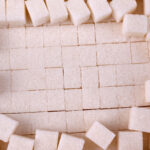 Are you full of good intentions to avoid chocolate, crisps, jellies or whatever your particular downfall is but still find yourself unable to fight off cravings? In many cases this is not simply mind over matter. Our bodies send us messages to eat these foods in a number of circumstances. Being aware of why we get cravings can be a big help in preventing them.
Are you full of good intentions to avoid chocolate, crisps, jellies or whatever your particular downfall is but still find yourself unable to fight off cravings? In many cases this is not simply mind over matter. Our bodies send us messages to eat these foods in a number of circumstances. Being aware of why we get cravings can be a big help in preventing them.
Before you reach for that chocolate bar ask yourself….
- Are you tired or feeling stressed? Your body reacts to these by producing cortisol, needed for the conversion of fats and glucose to sugar. This surge can lead to cravings for sugar and the types of food you try to avoid.
- Is your blood sugar balanced? Your pancreas produces insulin when you eat foods containing glucose, found in processed carbohydrates like bread, pasta and sugary treats. Insulin helps glucose enter cells to create energy and builds fat stores from the glucose not used up as energy. Blood glucose levels drop in response to insulin and can leave you feeling tired, cranky or even shaky. This can then trigger a craving for more glucose-containing food, and so the cycle continues….. The more sugar or glucose you consume, the more you need and it becomes an addiction, just like alcohol and caffeine.
- Could you have a nutrient deficiency? Lack of Vitamins B, C, Manganese and Zinc can impair our body’s ability to process sugar and lead to cravings.
Other factors that impact cravings…
- Are your chromium levels low? We need chromium to metabolise fats, carbohydrates and proteins effectively. Chromium deficiencies can lead to problems metabolising glucose and trigger cravings for more sugary foods. It can be helpful to test the above nutrients.
- Do you have enough good bacteria in your gut? When the ‘friendly’ micro flora in your gut are off-balance, fungi, yeast and ‘unfriendly bacteria have more opportunity to grow. Fungi and yeast need a high sugar environment to thrive and our bodies can crave sugar to fulfil this need.
- Are you dehydrated? When water is lost through dehydration or excessive sweating, our bodies remind us to get more fluid be either eating or drinking. We lose 1.5 litres of fluid each day through our skin, gut and urine. Tea, coffee, caffeinated soft drinks and alcohol all have a diuretic effect, meaning you’ll lose even more fluids by consuming these.
To avoid cravings wrecking your good intentions…
- Get plenty of sleep – most of us need at least 7or 8 hours
- Take active steps to manage stress levels – go for a walk, join an exercise class you enjoy or do some breathing exercises
- Eat little and often and include plenty of protein-rich foods like eggs, dairy, fish, hummus, pulses, nuts and seeds. These two steps help to balance blood sugar
- Avoid eating processed carbohydrates – white bread, white pasta, white rice and sugary snacks, these foods all promote a fast release of glucose and upset blood sugar balance
- Eat a balanced diet with lots of natural wholefoods. Include foods containing chromium like whole-grains, broccoli, mushrooms and green beans.
- drink plenty of water, aim for 1.5 litres
And remember, it’s what you do most of the time that really counts. So allow yourself the occasional treat, but stick to a healthy diet most of the time.
If you would like more information about the services we offer, including testing, please get in touch.

